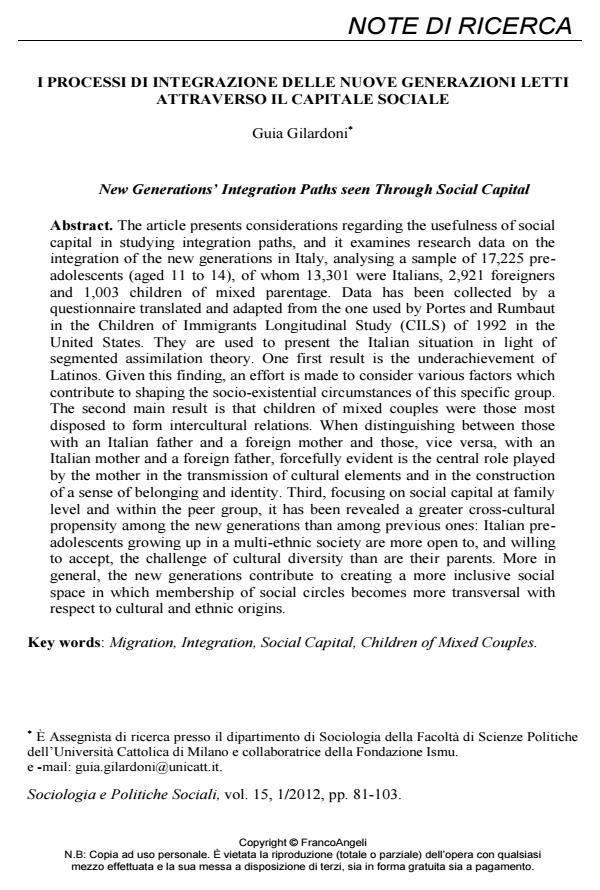New Generations’ Integration Paths seen Through Social Capital
Journal title SOCIOLOGIA E POLITICHE SOCIALI
Author/s Guia Gilardoni
Publishing Year 2012 Issue 2012/1
Language Italian Pages 23 P. 81-103 File size 450 KB
DOI 10.3280/SP2012-001005
DOI is like a bar code for intellectual property: to have more infomation
click here
Below, you can see the article first page
If you want to buy this article in PDF format, you can do it, following the instructions to buy download credits

FrancoAngeli is member of Publishers International Linking Association, Inc (PILA), a not-for-profit association which run the CrossRef service enabling links to and from online scholarly content.
The article presents considerations regarding the usefulness of social capital in studying integration paths, and it examines research data on the integration of the new generations in Italy, analysing a sample of 17,225 preadolescents (aged 11 to 14), of whom 13,301 were Italians, 2,921 foreigners and 1,003 children of mixed parentage. Data has been collected by a questionnaire translated and adapted from the one used by Portes and Rumbaut in the Children of Immigrants Longitudinal Study (CILS) of 1992 in the United States. They are used to present the Italian situation in light of segmented assimilation theory. One first result is the underachievement of Latinos. Given this finding, an effort is made to consider various factors which contribute to shaping the socio-existential circumstances of this specific group. The second main result is that children of mixed couples were those most disposed to form intercultural relations. When distinguishing between those with an Italian father and a foreign mother and those, vice versa, with an Italian mother and a foreign father, forcefully evident is the central role played by the mother in the transmission of cultural elements and in the construction of a sense of belonging and identity. Third, focusing on social capital at family level and within the peer group, it has been revealed a greater cross-cultural propensity among the new generations than among previous ones: Italian preadolescents growing up in a multi-ethnic society are more open to, and willing to accept, the challenge of cultural diversity than are their parents. More in general, the new generations contribute to creating a more inclusive social space in which membership of social circles becomes more transversal with respect to cultural and ethnic origins.
Keywords: Migration, Integration, Social Capital, Children of Mixed Couples.
Guia Gilardoni, I processi di integrazione delle nuove generazioni letti attraverso il capitale sociale in "SOCIOLOGIA E POLITICHE SOCIALI" 1/2012, pp 81-103, DOI: 10.3280/SP2012-001005